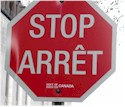
 |
Many Ways to Say Stop |
As said in the main page, French railways have invented the signalling system with the largest number of different ways of indicating arrêt (stop)...
At first, let me repeat that the main signals are equipped with a post plate which determines whether the stop aspect is permissive or absolute.
A permissive stop aspect is indicated by the post plates [F] and [PR], while the post plates [Nf] and [BM] indicate that the stop aspect is absolute. Signals with the [Nf] post plate (Non Franchissable - non passable) are called Carré signals, the others are called Sémaphores.
If is necessary to note that these signale names (Carré and Sémaphore) come from the mechanical signals, where a square (carré) was used as absolute stop and a semaphore (a signal with an arm, similar to German or British mechanical signals) used to indicate a permissive stop. With light signals, carré and sémaphore are merely the names of aspects.
There is no difference in the action required by a carré and a carré violet - both show an absolute stop. Both are also valid for train and shunting movements (with the exception that a dwarf signal showing carré violet can be ignored by trains that have been given a proceed indication by a main signal. But as all carré violets are cleared anyway this is only theory). The difference is that a carré violet is placed on service and shunting tracks, never on main tracks, and that a carré will probably show clear (voie libre) when cleared, while a carré violet will usually clear to shunting allowed (marche en manœuvre), i.e. drive on sight.
| Carré signals | |||||||
C - Carré |
CV -
Carré violet |
||||||
| Sémaphore signals | |||||||
S - Sémaphore |
S - Sémaphore |
||||||

S - Sémaphore |

(S) |
||||||
 Home Home |
 French signals French signals |
 email email |
 basics basics |
 proceed aspects proceed aspects |